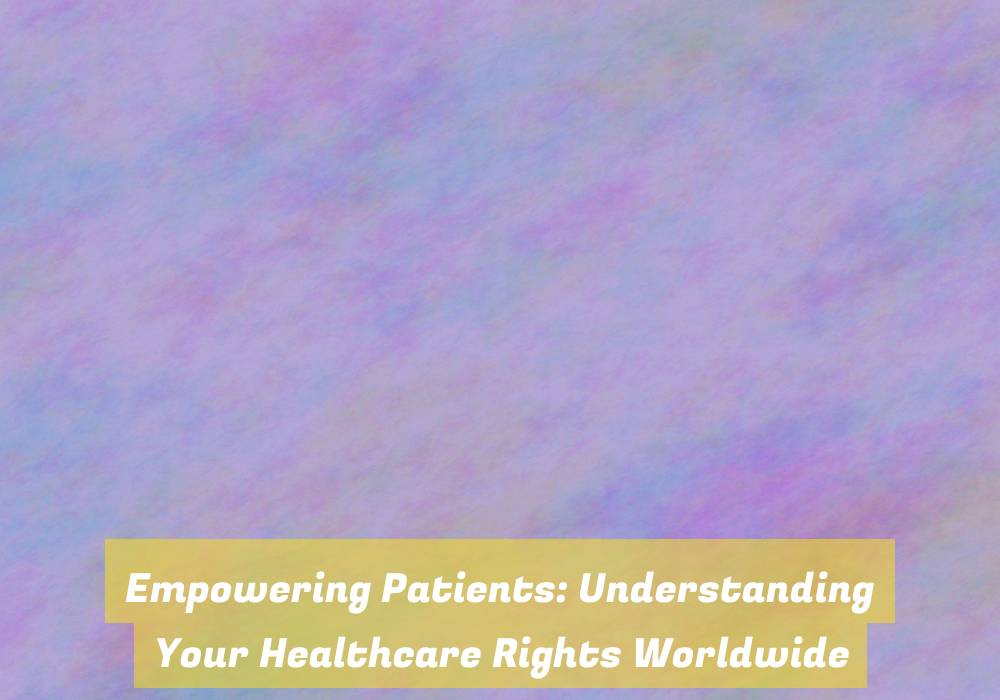Empowering Patients: Understanding Your Healthcare Rights Worldwide
As you navigate the complex world of healthcare, have you ever wondered about your rights as a patient on a global scale? Understanding and asserting your healthcare rights is not just a matter of personal empowerment, but a crucial step towards ensuring the delivery of quality care and treatment.
From access to information and informed consent to privacy and dignity, patientsG?? rights are universal and fundamental. However, the specifics of these rights can vary significantly from one country to another.
So, how can you ensure that you are well-informed and equipped to advocate for your rights, regardless of where you are in the world?
Importance of Healthcare Rights
Understanding your healthcare rights is essential for accessing quality medical care and ensuring your well-being. When youG??re aware of your healthcare rights, you have the power to make informed decisions about your treatment, participate in your healthcare planning, and voice your concerns without fear.
Knowing your rights also empowers you to demand respectful and dignified treatment from healthcare providers, regardless of your background or identity. Additionally, understanding your healthcare rights can help you navigate complex healthcare systems, access necessary medical services, and receive fair and transparent billing.
By being knowledgeable about your rights, you can actively contribute to the improvement of healthcare policies and advocate for equitable and accessible healthcare for all. Furthermore, knowing your healthcare rights can protect you from potential medical malpractice, negligence, or discrimination.
Ultimately, being well-versed in your healthcare rights allows you to take control of your health and well-being, ensuring that you receive the best possible care and treatment.
Key Healthcare Rights Worldwide
Knowing your healthcare rights empowers you to advocate for equitable and accessible healthcare for all, and understanding these key rights is crucial for navigating healthcare systems worldwide.
The right to access healthcare without discrimination is fundamental. This includes being treated with respect and dignity regardless of your race, gender, religion, or any other characteristic.
You have the right to receive clear and understandable information about your health condition, treatment options, and the potential risks involved. In addition, you have the right to participate in decisions about your care and to give informed consent before any medical treatment or procedure.
Moreover, you have the right to privacy and confidentiality regarding your medical information. You also have the right to access your own medical records and to request corrections if there are inaccuracies.
Importantly, you have the right to voice concerns, make complaints, and seek recourse without fear of reprisal.
Advocating for Your Rights
Advocate for your healthcare rights to ensure equitable and accessible treatment for all. ItG??s crucial to be proactive in safeguarding your rights as a patient.
Start by educating yourself about your rights and responsibilities as outlined by healthcare regulations in your country. Stay informed about the latest healthcare policies and laws that impact your access to treatment.
If you encounter any barriers or discriminatory practices, speak up and assert your rights. DonG??t hesitate to ask questions, seek clarification, and request a second opinion if needed.
Engage with support groups, patient advocacy organizations, and legal resources that can provide guidance and assistance. Consider sharing your experiences with healthcare providers, policymakers, and the public to raise awareness and drive positive change.
Ensuring Quality Care
To ensure quality care, actively engage with your healthcare providers and stay informed about treatment options and best practices. Building a collaborative relationship with your healthcare team can significantly impact the quality of care you receive. Ask questions about your condition, treatment plans, and potential side effects. Express any concerns or preferences you may have, and work together to make well-informed decisions.
ItG??s important to understand your rights as a patient, including the right to consent or refuse treatment, access your medical records, and seek a second opinion if needed. Stay proactive in managing your health by attending regular check-ups, following recommended preventive measures, and adhering to prescribed treatment regimens.
Educate yourself about your condition and treatment options from reliable sources, and consider seeking support from patient advocacy groups or online communities. By taking an active role in your healthcare, you can help ensure that you receive the quality care you deserve and improve your overall health outcomes.
Conclusion
Now that you understand your healthcare rights, itG??s important to advocate for yourself and ensure you receive quality care.
Whether youG??re in the United States, Europe, or anywhere else in the world, knowing and asserting your rights as a patient is crucial.
By being informed and proactive, you can empower yourself to make the best healthcare decisions for your well-being.
Remember, your health is important, and you have the right to access the care you deserve.






